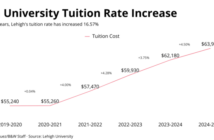The legacy acceptance rate for the class of 2026 marked its first decline in five years. Despite this decrease, it remains higher than non-legacy applicants.
According to data from the Office of Institutional Research & Strategic Analytics, the legacy acceptance rate had steadily increased since fall 2018 until now. For fall 2022, it sits at 54.4%, compared to 73.8% in fall 2021.
According to the same data, the 2022 legacy acceptance rate was almost 20% higher than the non-legacy rate at 36%. The class of 2026 is composed of 13% legacy students.
Lehigh’s Admissions Office defines a legacy student as having a familial connection to Lehigh through a parent, grandparent or sibling.
Director of Admissions Bruce Bunnick said there is no precise answer as to why the legacy acceptance rate decreased with the class of 2026. He said it is not the result of the office trying to increase non-legacy applicant numbers.
Bunnick said the university does not deliberately weigh a legacy status over other admission factors.
“It is taken into account, however, it is not used to replace or advantage a student who might unfortunately not have strong grades or a compelling record,” Bunnick said. “If all things are equal and a student is a legacy, they are not given a strategic advantage or a significant advantage over non-legacy.”
The acceptance rate for early decision legacy applicants was 96%. The non-legacy early decision rate was almost 63%.
Bunnick said the admissions office does not and never has had a limit on the number of legacies they accept in any of the admissions rounds.
He said they receive a higher number of legacy applications in the early rounds.
“We don’t set out from the beginning to say that legacies will deliberately have a higher acceptance (percentage),” Bunnick said. “If you look at our statistics, because students have clearly indicated Lehigh as a first choice in either Early I or Early II, numbers are generally higher.”
Overall, 42% of legacy applicants accepted their offer to Lehigh, while non-legacy applicants yielded 25.6%.
Dan Warner, vice provost for admissions and financial aid, wrote in an email to The Brown and White many schools admit higher rates of legacy applicants because they are more likely to enroll.
“To some outside observers, this would suggest there is a different standard,” Warner said. “I cannot say that is not true anywhere, but at Lehigh and most other places I’ve worked or am familiar with, it is primarily the result of something else: likelihood to enroll. Simply put, it is a practical reflection of our preference, among more or less equally attractive candidates, to admit those who will attend if admitted.”
Legacy students are not the only group that has a higher acceptance and yield rate. Warner said under-resourced first-generation students also tend to have a higher yield and, thus, have more consideration for their applications.
He wrote both legacy candidates and the community-based organization applicants will get some measure of consideration for their increased likelihood to enroll.
“It does not change our process or the standard we apply, but when we have more qualified applicants than we have room for, likelihood to enroll can become one of many determining factors,” Warner said.
Warner said these nuances and factors are not mentioned in public conversations about legacies in the college admission process, but he wishes they were.
Allison Lee, ‘24, whose dad attended Lehigh, applied to Lehigh as a second-round Early Decision applicant after getting deferred from her first choice. She said she wanted to maximize her chances of getting accepted to Lehigh by applying in the second early round.
She said legacy students may generally have a higher yield rate because they have been more exposed to their parents’ Lehigh experience and are inspired to choose the same path.
“I can see the combination of Lehigh students of alumni seeing their parents maybe become successful and also have long-lasting friendships,” Lee said. “I think that’s a swaying factor. It’s definitely something I can recognize in my own dad and in his friendships from Lehigh.”
Warner said the Admissions Office appreciates receiving applications from alumnus children, grandchildren and those with other familial connections to Lehigh in their process.
He said it is especially rewarding that a significant number of legacy applicants make Lehigh their first choice.
“It is gratifying to know that their (family member’s) experience was so positive that their excitement for Lehigh translates to those future generations,” Warner wrote.





Comment policy
Comments posted to The Brown and White website are reviewed by a moderator before being approved. Incendiary speech or harassing language, including comments targeted at individuals, may be deemed unacceptable and not published. Spam and other soliciting will also be declined.
The Brown and White also reserves the right to not publish entirely anonymous comments.